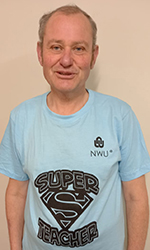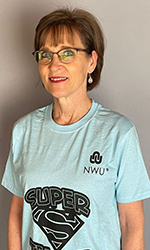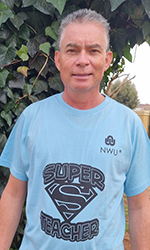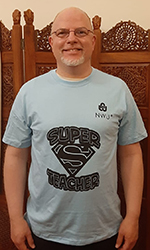The Faculty of Education at the North-West University (NWU) believes it requires more than just an ordinary teacher to make an impactful contribution in the education sector ― it takes a super teacher to cultivate, motivate and educate South Africa’s young minds.
This is why the university has embarked on excursions since 2016, bringing thousands of first-year BEd students from the NWU’s three campuses, as well as the distance students, together to inspire, train and engage with them on what it means to excel in the career of being a teacher. Since third- and fourth-year BEd students act as facilitators, the excursions also provide these students with the opportunity to further develop their skills to be effective facilitators, which will empower them for their future careers.
Taking activities online, including other faculties
The NWU is taking an innovative new approach to ensure that students do not miss out on these essential and popular annual excursions despite Covid-19 restrictions. The first completely virtual excursions are set to take place from 16 August to 28 September and will for the first time, as a pilot project, also involve students from the Faculty of Health Sciences and the Faculty of Law.
Prof Josef de Beer, research professor in the Research Unit for Self-Directed Learning (SDL) in the Faculty of Education, and Prof Neal Petersen, deputy director of the School of Mathematics, Science and Technology Education and a researcher in SDL, the two main organisers, say that 2 500 education students, 600 law students and 300 healthcare students will participate in the virtual excursions, which will focus on the specific needs of each of the three faculties.
Josef and Neal say one of the main benefits of the excursions is that they aid the university in fostering its unitary sense of belonging among students. “We are using new software that randomly selects students from our different campuses and places them together in new representative groups of five.”
Students get the opportunity to experience what it means to be an NWU student by interacting with their peers without being tied down to a specific campus. In this way, they learn from each other and can break down the walls of preconceived stereotypes they may have. The excursions also sensitise students to the importance of self-directed learning and setting personal learning goals for themselves.
Josef says they are able to expand the excursion offering to the other faculties this year through the University Capacity Development Programme grant. “This has also enabled us to provide each participating student with 10 GB of data to ensure that they can fully experience the exciting activities in their fields of learning that form part of the excursions.”
Breaking down the walls of bias
Josef and Neal explain that there are a number of persistent problems that higher education, and specifically the NWU, needs to address. These two researchers say the excursions are one vehicle to do so.
These problems include that, as research has shown, many first-year students often have a naïve understanding of the demands of studying at tertiary-education level, and the world of work they will enter. The excursions expose them to scenarios in which teachers may find themselves and enable them, through peer discussions, to find solutions to them.
“Research also highlights the need to promote self-directed learning in educational programmes. The excursions use strategies such as problem-based and cooperative learning, which hold the potential to enhance self-directed learning. They also point out the importance of continued self-directed learning during their careers.”
De Beer says the excursions also offer lecturers the opportunity to sensitise students about their biases, which are a big barrier when working with diverse learners in schools. “We live in a country that is plagued by gender-based violence, discrimination, homophobia and other social ills, and the excursions create the ideal platform to address such issues in the informal curriculum.”
Games and activities mirror real-world challenges
The games and activities offer students an opportunity not only to engage but also to mirror real-world challenges.
During the Famine and Abundance Game, for instance, students receive virtual money and digital passports, making them virtual citizens of either rich or poor countries. According to Josef and Neal, many students experience this game as an eye-opener when they realise the big divide that exists between the haves and the have nots. “For many of them, it is the first time they realise how difficult it is for people to survive in poor circumstances. They are able to experience the difference between famine and abundance first-hand, and what it means for teachers in diverse classrooms.”
Books document findings on excursions
The Department of Higher Education and Training has approved funding for a series of AOSIS books that will form part of the Self-Directed Learning Book Series.
The books will focus on the findings of research on the first-year excursions from all three participating faculties of the NWU.
The first book will be written in 2021 and will focus on the affordances of such virtual excursions. The book will be edited by Josef, Neal, Prof Robert Balfour, deputy vice-chancellor for Teaching and Learning, and Prof Elsa Mentz, director of the Research Unit for Self-Directed Learning.
The other two books will be completed in 2022 and 2023 respectively.
 |
 |
 |
 |
The editors of the books on research about the excursions are Prof Josef de Beer, Prof Robert Balfour, Prof Neal Petersen and Prof Elsa Mentz. They proudly wear their super teacher T-shirts.

Each participating student receives a super teacher T-shirt via courier as a keepsake.
